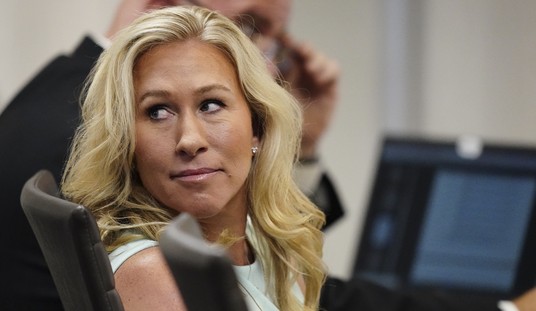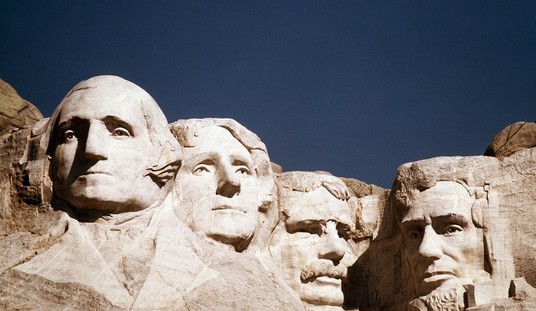Defeating ISIS will take a “multi-year effort” from a large coalition of nations, Barack Obama tells ABC News’ George Stephanopoulos, while arguing that ISIS is not getting stronger. That’s an interesting take from a president who claimed less than two years ago that ISIS was the “jayvee team” and that Iraq alone could deal with their rebellion. Now, Obama says there aren’t enough troops on the ground to “decapitate” the varsity of Islamist terrorist groups, but that Obama wants to be well on the way to that goal before he leaves office.
Gee … wouldn’t it be nice to have had troops in Iraq, if that’s the case?
“I don’t think they’re gaining strength,” the president told Stephanopoulos in an interview at the White House Thursday. “From the start our goal has been first to contain, and we have contained them. They have not gained ground in Iraq. And in Syria it — they’ll come in, they’ll leave.
“But you don’t see this systematic march by ISIL across the terrain,” he added, using the government’s acronym for ISIS. …
The president said his team has crafted a strategy that “contained the momentum that ISIL had gained,” but said there will continue to be problems in the region “until we get the Syria political situation resolved.”
“Until [Syrian President Bashar al-] Assad is no longer a lightning rod for Sunnis in Syria and that entire region is no longer a proxy war for Shia-Sunni conflict, we’re going to continue to have problems,” he said. “I would distinguish between making sure that the place is perfect — that’s not going to happen anytime soon — with making sure that ISIL continues to shrink in its scope of operations until it no longer poses the kind of threat that it does.”
Obama laughs off Ben Carson’s suggestion that we could take out ISIS just by bombing their oil fields. However, that was pretty much Obama’s strategy as announced fourteen months ago — to stage limited air strikes that would force ISIS to collapse back in on itself. Let’s also recall that even at that time, Obama didn’t blame himself for ignoring the problem, but the US intelligence community … kind of like how Obama scoffs at military experts informing Carson on strategy. Now Obama admits that it’s going to take several years at the pace of the effort thus far just to push ISIS backwards, let alone decapitate their leadership.
For that matter, what’s the difference between Carson’s suggestion and the strategy employed by Obama thus far? Not much besides targeting. The US wants to preserve the oil fields for the Iraqi government, which is probably wise, but it’s also true that ISIS is making a fortune off of black-market oil sales. Cutting off that income could have a significant impact on their operations, even if in the end other strategic and diplomatic considerations outweigh it. Otherwise, though, Obama won’t going to put troops on the ground in any significant numbers, even if others refuse to do so, whether or not Assad leaves Syria for a dacha on the Black Sea. That’s laughable, but not for the reasons Obama thinks.
Meanwhile, the US and UK still have not reached a conclusion on whether “Jihadi John” was the target that got evaporated in the drone strike overnight, but they’re getting more confident in that conclusion, according to the Pentagon. John Kerry used this as a springboard to warn “Daesh” that its days are numbered:
This might mean something more if the US and its coalition was actually pushing ISIS off of territory it now controls. Picking off one terrorist at a time isn’t going to lead to the destruction of any quasi-state — only seizing its territory will accomplish that, and ISIS has already seen how reluctant its enemies are at doing so.
Addendum: The Kurds claim that they have taken back some territory, defeating ISIS forces around Sinjar with the help of US airstrikes. How long that lasts, and whether Sinjar becomes a flashpoint between the Kurds and Baghdad, remain to be seen:
Iraqi Kurdish leader Massud Barzani announced the “liberation” of Sinjar from the Islamic State group Friday in an assault backed by US-led strikes that cut a key jihadist supply line with Syria.
The operation was led by the Iraqi autonomous Kurdish region’s peshmerga forces and also involved fighters from the Yazidi minority, a local Kurdish-speaking community targeted in a brutal IS campaign of massacres, enslavement and rape. …
Barzani’s remarks also made clear that political conflict over Sinjar would likely follow the military battle for the town.
“Sinjar was liberated by the blood of the peshmerga and became part of Kurdistan,” Barzani said.
Baghdad, which has long opposed Kurdistan’s desire to incorporate a swathe of disputed northern territory, is unlikely to welcome the idea of Sinjar becoming part of the Kurdish region.
Then maybe Baghdad should have chosen to join up with the Kurds in the north for this fight, rather than rely on Iranian paramilitary forces to attack ISIS in Ramadi and Fallujah, for no current gain. The Kurds are going to lay claim to territory they liberate, and that will very quickly become a huge problem in the anti-ISIS fight. It’s a problem that we could have avoided had we remained in Iraq, and had we led this fight on the ground.







Join the conversation as a VIP Member